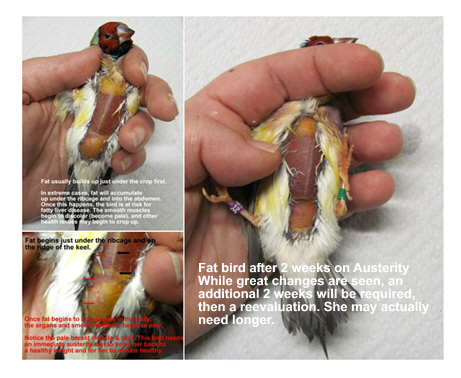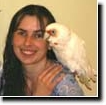Colds, Diarrhea, Sinus & Respiratory Disease Issues
in Gouldians & Other Finches
Kristen Reeves, Meadowlark Farms Avian Supply, Inc.
Sometimes our birds may have a simple cold, a little diarrhea or some sinus/respiratory problem that we cannot contribute to another disease. This article describes some of the symptoms and ideas about the potential reasons the problem came about, along with typical treatments.
Keep in mind that while “tail bobbing” is typically associated with some type of respiratory disease, there are many reasons for tail bobbing including obesity, a hen preparing to lay an egg, poor condition, or recent stress.
If your bird is tail bobbing and you do not know why, first check the bird for signs of respiratory distress visually. Check for nasal discharge and lesions around the nares, and mucous in the mouth. Listen to their chest - are they clicking, have raspy breathing or gurgling sounds? If so, the bird may have an upper respiratory infection or an air sac mite infestation.
A respiratory infection should be treated with antibiotics, but because there are several bacteria that can cause the infection, it is best to have your Avian Veterinarian run cultures to determine which medication will be best to eradicate the bacteria.
Viral infections may also show similar symptoms. Unfortunately, there is no way to test for viruses without running a costly PCR, a form of DNA testing. These tests are expensive, but if the virus is infectious, it will be beneficial to have the test done so you can avoid it in the rest of your flock. In most cases, viruses won't have any kind of treatment. Like in humans, the body must build immunity - most doctors won't give an antibiotic, but they may recommend vaccinations. There are vaccinations for "some" bird viruses, but not all. If you or your Veterinarian can find no bacterial or parasitic reason for your bird's illness, it could be viral.
Air sac mites are easily treated with Ivermectin or Moxidectin, though if left untreated for long, the medication could kill the mites in such large quantities that they completely block the airway and suffocate the bird. Treat early and use CONSISTENT preventive measures to avoid an air sac mite infestation.
If the bird does not show the aforementioned signs of respiratory illness or air sac mites, check for obesity.

Blow the feathers away from the crop area just above the breast, along the keel ridge, and again under the rib cage in the abdomen area. If the feathers will not stay out of the way long enough to view the abdomen, wet the feathers with warm water and part them to the side. Fat will look “yellow” under the skin and often forces the crop and abdomen to protrude somewhat causing a split in the feathers down the center of the body from crop to vent. Do you see signs of fat under the skin? If you don't find any of the above, watch the nest box and cage bottom for eggs! You may have a hen that is trying to pass eggs - whether she is in condition or not!
COLDS
Like humans, sometimes our birds “just get a cold”. They may have been stressed lately lowering their immune system, or they may have been subjected to a draft that allowed them to become chilled.
Cold symptoms may include runny nose, sneezing, and fluffing...it may be obvious your bird just doesn't feel good. Sound familiar? Think about the last time you had a cold! You didn't feel very good either!
The best treatment for a cold is to place the bird in the hospital cage with some heat until it appears to feel better. An electrolyte solution such as Dr. Rob Marshall’s QuikGel or NV Powder may be administered for 3-5 days, but be aware that electrolytes with sugar in them can cause additional grief. Offering them for too long can actually make matters worse as the body’s bacteria feeds off that sugar causing Candida (yeast infection).
After the electrolytes, use MegaMix in the drinking water at a rate of 1/4 tsp to 1 litre of water. This should help to keep any additional bacteria from taking hold while the bird is “down” and inhibit yeast production. If your bird does not respond to the above treatment, consult your Avian Vet for a more thorough examination.
DIARRHEA
Often referred to as Enteritis, again, like us humans, sometimes our birds get a little tummy trouble going on. If they ate a new food or were recently stressed, their droppings may be off and a bit watery. BUT, wet, messy droppings aren’t usually considered diarrhea unless it continues for several days and gets worse.
A few days of wet poo isn't anything to worry about unless it continues. If you know your bird has been stressed, you've changed their food recently, or added something new, like fresh greens; chances are the wet poo will go away. A couple days in the hospital cage with heat and electrolytes should cure the problem.
However, if it continues, the bird may have contracted a bacterial infection, or even internal parasites of one kind or another. If the wet poo persists, consult your Avian Veterinarian!
SINUS & RESPIRATORY PROBLEMS
Sometimes our birds will have a nasal blockage resulting in noisy breathing and/or tail bobbing. If they've had a cold or a recent case of scaly face mites, there may be discharge or exudate (waxy substance the bird produces to protect it's beak from the mites) blocking the nares and causing sneezing, pronounced wiping of beak on perches, scratching at their heads and rough breathing.
Applying a very thin layer of miner oil or Vaseline to the clogged areas should soften it an allow the bird to dislodge the blockage itself. If this does not work, you may need to attempt to VERY CAREFULLY remove the blockage (or have your Avian Vet do it) with a toothpick or needle. This should be done with extreme caution.
On occasion, a bird with nasal discharge or phlegmy material in it's mouth and throat may be suffering from a Vitamin A deficiency, Trichomonas (see Internal Parasites link for more information), or a yeast infection (Candida).
Proper nutrition and the use of an electrolyte - as well as a bit of heat, will help the bird to regain its strength and recover more quickly. If you are unsure whether this is a health issue you can manage, consult your Avian Veterinarian for help!
FINAL WORD...
The information contained here is for reference purposes only. As always, if you suspect your bird is sick, take it to an Avian Veterinarian!





